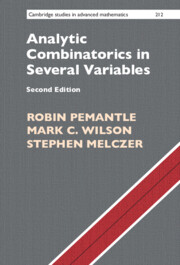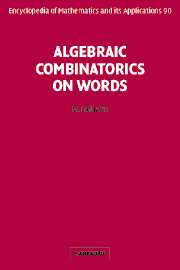Analytic Combinatorics in Several Variables
Discrete structures model a vast array of objects ranging from DNA sequences to internet networks. The theory of generating functions provides an algebraic framework for discrete structures to be enumerated using mathematical tools. This book is the result of 25 years of work developing analytic machinery to recover asymptotics of multivariate sequences from their generating functions, using multivariate methods that rely on a combination of analytic, algebraic, and topological tools. The resulting theory of analytic combinatorics in several variables is put to use in diverse applications from mathematics, combinatorics, computer science, and the natural sciences. This new edition is even more accessible to graduate students, with many more exercises, computational examples with Sage worksheets to illustrate the main results, updated background material, additional illustrations, and a new chapter providing a conceptual overview.
- Develops classical tools in topology and analysis from a computational point of view to motivate the study of abstract mathematical theories, and to show how pure mathematics can be applied to concrete applications in mathematics, computer science, and the natural sciences
- Provides an exposition that weaves in the considerable background material in a way that a graduate student can successfully tackle
- Allows readers to replicate computations and check their work in Sage worksheets
- Comprehensively surveys forty years of development of an emerging field, and shows that combinatorial problems can draw together many fields of mathematics, including algebraic geometry, harmonic analysis, and singularity theory
Reviews & endorsements
'A definitive treatment of a challenging but very useful subject. There is a wide variety of situations calling for the estimation of the coefficients of a multivariate generating function. The authors have done a superb job of classifying and elucidating the myriad of available techniques for achieving this aim.' Richard P. Stanley, University of Miami
'This book is an invaluable resource that is certain to have dramatic impact on research and teaching in this rapidly developing area of mathematics. The first edition broke new ground; this edition prepares the field for others to harvest new knowledge with important applications in many scientific disciplines.' Robert Sedgewick, Princeton University
Product details
February 2024Hardback
9781108836623
592 pages
236 × 158 × 37 mm
1.02kg
Available
Table of Contents
- Part I. Combinatorial Enumeration:
- 1. Introduction
- 2. Generating functions
- 3. Univariate asymptotics
- Part II. Mathematical Background:
- 4. Fourier–Laplace integrals in one variable
- 5. Multivariate Fourier–Laplace integrals
- 6. Laurent series, amoebas, and convex geometry
- Part III. Multivariate Enumeration:
- 7. Overview of analytic methods for multivariate generating functions
- 8. Effective computations and ACSV
- 9. Smooth point asymptotics
- 10. Multiple point asymptotics
- 11. Cone point asymptotics
- 12. Combinatorial applications
- 13. Challenges and extensions
- Appendices: A. Integration on manifolds
- B. Algebraic topology
- C. Residue forms and classical Morse theory
- D. Stratification and stratified Morse theory
- References
- Author index
- Subject index.









